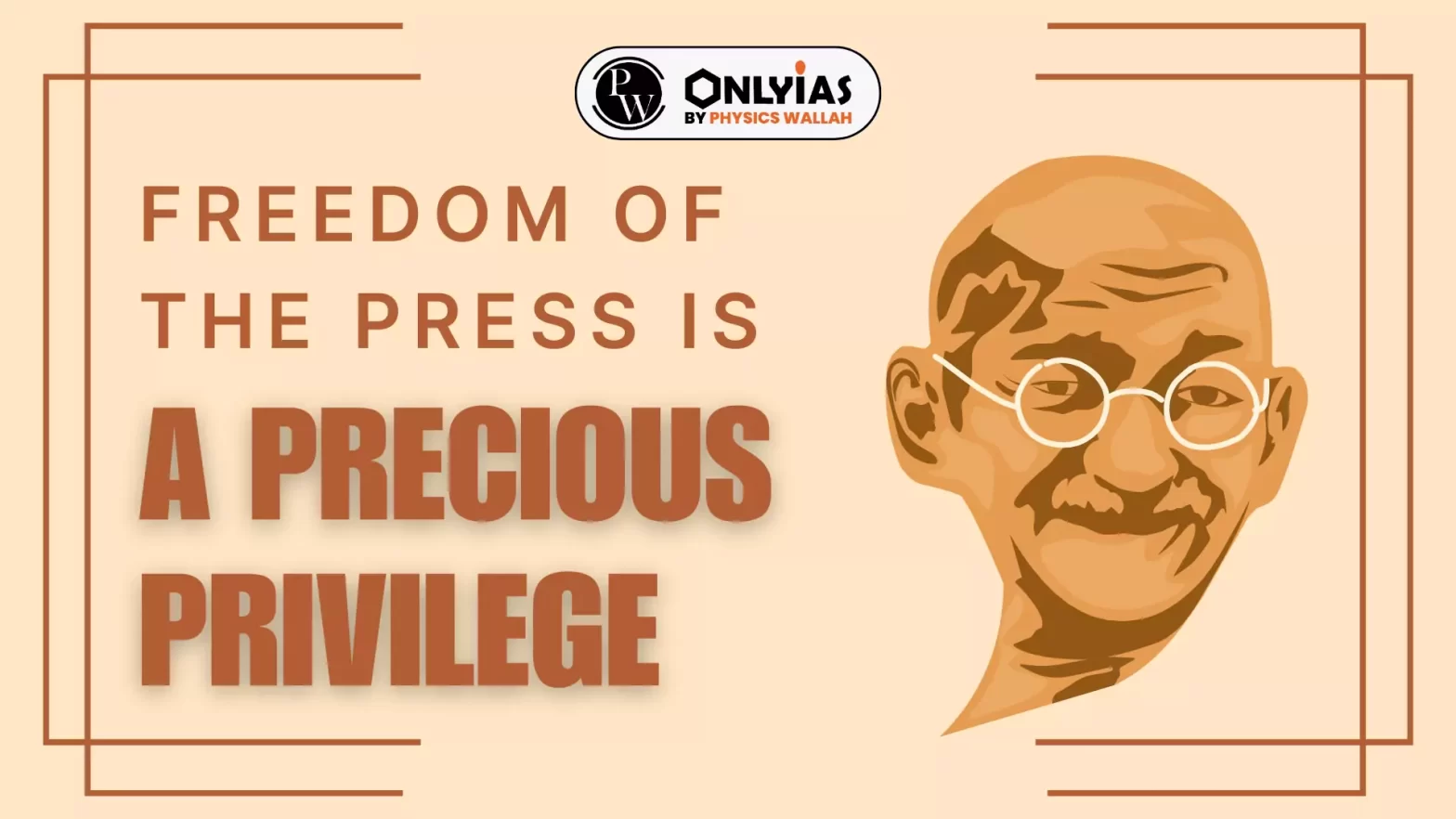Context
May 3 marks World Press Freedom Day, in recognition of protecting the core principles guiding journalism.
Background of World Press Freedom Day
- UN Declaration: The United Nations proclaimed the day as such in December 1993, to mark the anniversary of the Declaration of Windhoek.
- Advocating Press Freedom and Responsibility: The Namibia Declaration, forged during a 1992 UNESCO seminar in Namibia, emphasized the vital responsibilities of journalists, advocated for a non-monopolistic media landscape, and upheld the principle of press freedom.
- Protection of Journalists: During a recent speech at the UN General Assembly, President Dennis Francis emphasized the words of Mahatma Gandhi, stating that ‘freedom of the press is a precious privilege that no country can forego.’
- On World Press Freedom Day, he urged a renewed commitment to safeguarding journalists and media workers globally.
Enroll now for UPSC Online Course
Mahatma Gandhi the Journalist
- Gandhi’s Mobilization for Social Change: Recognizing the potency of collective action for societal transformation, Gandhiji, even during his time in South Africa, endeavored to rally the Indian community.
- Gandhi’s Vision through Indian Opinion: Launching the newspaper Indian Opinion at the age of 33, Gandhi aimed to raise awareness of colored needs, foster diaspora unity, and prompt introspection among Indians, as historian Ramchandra Guha observes.
- Gandhi’s Advocacy for Press Freedom: Gandhi also acknowledged the importance of a liberated press, encompassing protection not only from political oppression but also from corporate influences.
- Gandhi’s Editorial Stand Against Advertisements: In a 1912 edition of Indian Opinion, Gandhi expressed a shift in perspective, stating, ‘We now feel that we should also discontinue the practice of publishing advertisements.’
- Initially deeming advertisements beneficial, upon reflection, he deemed the practice undesirable, attributing it to the impatience of individuals seeking wealth and advantage over competitors.
- Gandhi’s Pioneering Mass Communication Efforts: Especially during Gandhi’s era, the avenues for mass communication were severely restricted. However, Gandhi would eventually initiate newspapers in India as well, including Young India, Navajivan, and Harijan.
Significance of Journalism
- Facilitate Exchange of Ideas: These enduring principles of journalism highlight its role as a universal platform facilitating idea exchange and providing insight into contemporary events serving as a historical archive, journalism reflects the zeitgeist, capturing the thoughts, aspirations, and intended audience of its time.
- Unifying Power of Journalism: Journalism, through narratives, fosters comprehension of shared experiences and mutual concerns, offering diverse perspectives.
- Fundamentally, it functions as a conduit bridging societal divides by impartially covering all segments of the community.
Meaning of Quote:“Freedom of the press is a precious privilege that no Country can forego”
- Challenges of Press Freedom: While essential, a free press isn’t flawless. Frequently, the press’s framework allows dominant societal factions to shape narratives, primarily promoting their interests and ideologies.
- Critiques of Gandhi’s Journalism: Gandhi’s journalistic endeavors were not devoid of imperfections. According to Guha, ‘Some subsequent Marxist historians viewed Indian Opinion as mirroring the class prejudices of its merchant backers.’
- The publication did engage with issues like taxation and trade, which directly impacted these merchants.
- Importance of a Free Press: Absence of press restrictions also enables criticism and facilitates corrective measures. Thus, despite its imperfections, a free press holds significant importance.
- Indian Opinion’s Advocacy for Social Justice: Guha notes that Indian Opinion passionately advocated for Indian indentured laborers and occasionally championed the rights of Africans, shedding light on their dispossession by European farmers and the injustice of their exclusion from parliamentary representation.
- Vital Role of Press Freedom: Sacrificing press freedom leaves minimal channels for critiquing societal institutions like the government, politicians, and judiciary, as well as challenging ideologies such as patriarchy, casteism, and colonialism.
- This fosters a top-down structure devoid of constructive feedback, ultimately contributing to the deterioration of a nation unwilling to confront its shortcomings.
Enroll now for UPSC Online Classes
Conclusion
Freedom of the press is a privilege – something not accorded easily. But its absence is detrimental to the society as a whole.
Also Read: India’s Press Evolution Post First World War
![]() 6 May 2024
6 May 2024
